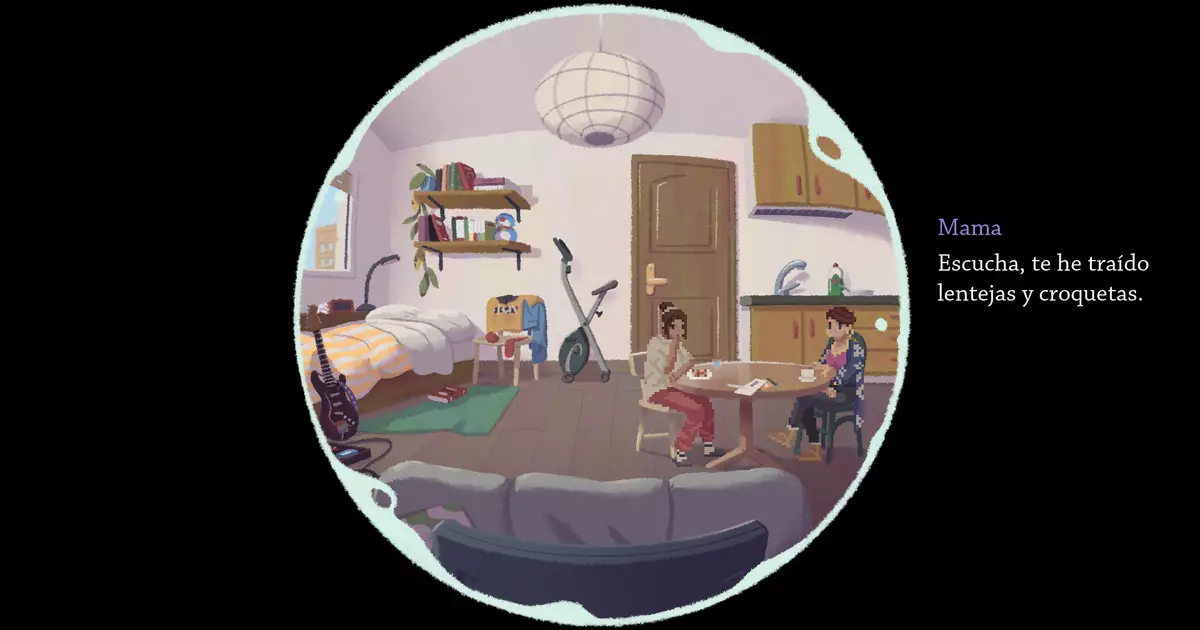In recent years, the gaming industry has seen a rise in titles that address mental health topics, leading to the emergence of a unique genre: recovery games. One such example is “Vendrán Las Aves,” a poignant yet calming experience tailored around the themes of burnout and emotional recovery. Developed by the trio Francisco Riolobos, Chuso Montero, and Deconstructeam—developers well known for their narrative depth in titles like The Red String Club and The Cosmic Wheel Sisterhood—this game provides players with an intimate look into coping mechanisms for emotional exhaustion. By embodying a character grappling with the ramifications of burnout, players engage in a slice-of-life narrative that ultimately champions hope against despair.
The game’s premise revolves around the protagonist who has just exited a taxing work environment, seeking solace and rejuvenation within the confines of their one-room apartment. Here lies the brilliance of Vendrán Las Aves: it fuses simple mechanics with deep emotional narratives. Rather than shocking the audience with dramatic story twists, it invites them into the quiet mundanity of recovery—successfully capturing the heaviness of living with burnout while offering an avenue toward healing.
At the heart of Vendrán Las Aves lies an uncomplicated resource management system. Each day, players are presented with a finite amount of energy to allocate among different activities—eating, resting, engaging in leisure, or tackling domestic chores. This setup mirrors reality in a manner that is, at once, grounded yet simplified for therapeutic engagement. The character’s feelings of exhaustion resonate with players, encapsulating the struggles many face in a fast-paced world that often demands too much, thereby squeezing the lifeblood from creativity and joy.
This mechanic of energy distribution subtly teaches an important lesson about self-care: it’s not always about maximizing productivity; sometimes, it’s about finding balance in the mundane. Players are reminded that it’s perfectly acceptable to spend a day doing nothing but unwinding. Thus, while the game operates under a point-based structure, it ultimately imparts a nuanced understanding of personal limitations and the significance of compassion—in particular, self-compassion.
While personal agency plays a central role in healing, it is crucial to acknowledge an often-understated reality: the power of community support. As players navigate the protagonist’s journey, they encounter opportunities to accept help from friends or family, like when a mother arrives with homemade meals—a warm, empathetic gesture. This aspect of the gameplay is especially poignant, as it reinforces the idea that recovery isn’t simply a solitary endeavor; it’s about leaning on others when the burdens become too heavy to carry alone.
Within the game, accepting support becomes an act of bravery rather than weakness. Here, Vendrán Las Aves transcends the individual experience of burnout and ventures into the realm of communal healing, reminding players that vulnerability can indeed foster connection and understanding.
With its delicate portrayal of burnout, the narrative does not shy away from criticizing systemic issues—an important aspect often overlooked in individualistic discussions surrounding mental health. By implying that burnout is not merely a personal failure, but rather a collective one, the game sparks an essential dialogue about workplace environments and societal expectations.
Moreover, the juxtaposition of the protagonist’s love for their craft against the backdrop of their dissatisfaction serves to enlighten players about the intricacies of passion and pressure. Burnout is depicted as a multifaceted dilemma; while the character struggles with exhaustion, there remains a flicker of hope and longing to return to their creative pursuits.
Though a deep and engaging exploration of burnout, Vendrán Las Aves does not offer a seamless conclusion. Instead, it encapsulates the ongoing struggles faced by many, accompanied by the essential message that recovery is a continuous journey rather than a finite destination. As players guide the character slowly towards rebuilding their morale, they are also encouraged to reflect on their own paths to well-being.
While it may draw comparisons to traditional tamagotchi games, Vendrán Las Aves transcends superficiality with its emotionally charged storytelling. It doesn’t shy away from addressing the core issues of mental well-being, while also gently urging players to appreciate the small moments of triumph and healing. With its compelling narrative and thoughtful mechanics, Vendrán Las Aves stands as a testament to the power of video games as platforms for empathy, understanding, and even recovery.

